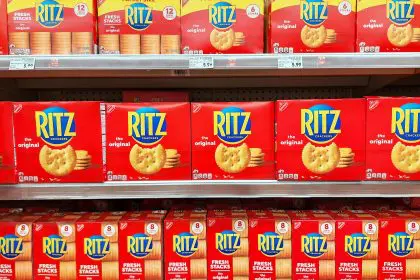Shoppers across the Midwest are being urged to check their pantries after a popular grocery chain issued an urgent recall for chocolate-covered almonds that could pose serious health risks to unsuspecting consumers.
Meijer, the beloved regional supermarket chain, has recalled specific packages of Frederik’s Dark Chocolate Almonds sold at stores throughout Michigan, Indiana, Illinois, Ohio, Kentucky and Wisconsin. The recall was triggered by a potentially dangerous labeling error that could lead to life-threatening allergic reactions for customers with cashew sensitivities.
The affected products include black 12-ounce pouches with sell-by dates of May 7, 2026, or May 28, 2026, as well as 1.5-ounce multi-pack boxes bearing a sell-by date of May 5, 2026. What makes this recall particularly concerning is that the chocolate-covered almond packages may actually contain chocolate-covered cashews, which are nowhere to be found on the product labeling.
The hidden danger lurking in chocolate treats
Food and Drug Administration officials emphasized the severity of this mislabeling issue, explaining that consumers who believe they’re purchasing chocolate almonds could unknowingly consume cashews instead. For individuals with cashew allergies or sensitivities, this mix-up could trigger serious medical emergencies.
The potential consequences extend far beyond a simple case of mistaken identity. Cashew allergies can cause symptoms ranging from mild digestive discomfort to severe anaphylactic shock, which can be fatal without immediate medical intervention. Tree nut allergies, including cashew allergies, affect millions of Americans and are among the most common food allergies that persist into adulthood.
What makes this situation particularly troubling is that many consumers rely heavily on product labels to make safe food choices. When someone with a cashew allergy picks up a package clearly labeled as chocolate almonds, they have every reason to believe the product is safe for them to consume. This type of labeling error undermines the trust that consumers place in food manufacturers and retailers to provide accurate information about ingredients.
How the recall came to light
The recall process began when a vigilant Meijer customer contacted the company to report receiving a product that didn’t match its labeling. This customer complaint prompted an investigation that revealed the extent of the mislabeling issue, leading to the comprehensive recall across multiple states.
Meijer’s swift response to the customer complaint demonstrates the importance of consumer vigilance and the company’s commitment to food safety. The grocery chain took immediate action upon learning of the problem, working with federal regulators to ensure potentially dangerous products were removed from shelves and customer homes.
Fortunately, no illnesses have been reported in connection with this recall as of the announcement date. However, health officials stress that the absence of reported cases doesn’t diminish the seriousness of the potential risk, especially considering that allergic reactions can occur quickly and without warning.
Understanding the scope of the recall
The recall affects Meijer stores across six Midwest states, covering a significant portion of the grocery chain’s footprint. Meijer operates more than 240 stores throughout the region, making this recall a substantial undertaking that requires coordination across multiple state health departments and regulatory agencies.
The specific nature of the recalled products makes identification relatively straightforward for consumers. The Frederik’s Dark Chocolate Almonds come in distinctive black packaging, and the recalled items have clearly defined sell-by dates that make it easy for shoppers to determine whether their products are affected.
Customers who purchased these items should immediately check their pantries and dispose of any products that match the recalled description. Even if no one in the household has a known cashew allergy, it’s important to remove these products from circulation to prevent accidental consumption by visitors or family members who may have undisclosed allergies.
What consumers need to know about cashew allergies
Cashew allergies are part of the broader category of tree nut allergies, which can cause severe reactions in sensitive individuals. Unlike some food allergies that may cause only mild symptoms, tree nut allergies frequently trigger serious responses that require immediate medical attention.
Symptoms of cashew allergic reactions can include hives, swelling of the face and throat, difficulty breathing, rapid pulse, dizziness, and digestive issues. In severe cases, exposure can lead to anaphylaxis, a whole-body allergic reaction that can be fatal if not treated promptly with epinephrine.
Many people with tree nut allergies carry emergency medications like EpiPens specifically because of how quickly and severely these reactions can develop. The unpredictable nature of allergic reactions means that even small amounts of the allergen can trigger dangerous symptoms.
Steps for affected customers
Meijer is making the return process as simple as possible for customers who purchased the recalled products. Shoppers don’t need to provide receipts or jump through complicated hoops to get their money back. They can simply bring the recalled items to any Meijer customer service desk for a full refund.
The company is also encouraging customers to spread the word about the recall to friends and family members who may have purchased the affected products. Given that many people buy groceries for others or share food items, it’s possible that recalled products could end up in the hands of people who aren’t aware of the recall.
The broader implications for food safety
This recall highlights ongoing challenges in food manufacturing and labeling that affect the entire industry. Mix-ups in production facilities can happen for various reasons, from equipment malfunctions to human error during packaging processes. When different products are manufactured on the same equipment or in the same facility, cross-contamination becomes a constant concern.
Food manufacturers are required to follow strict protocols to prevent these types of errors, including thorough cleaning procedures between product runs and careful monitoring of labeling systems. However, the complex nature of modern food production means that mistakes can still occur despite best efforts to prevent them.
Moving forward with confidence
While this recall serves as a reminder of the importance of food safety vigilance, it also demonstrates how the system is designed to protect consumers when problems arise. The quick identification of the issue, rapid recall implementation, and clear communication to the public show that safety mechanisms are working as intended.
Consumers can help protect themselves by staying informed about recalls, carefully reading product labels, and reporting any concerns to manufacturers or retailers. The customer who initially reported this problem to Meijer played a crucial role in preventing potential harm to others.
For those affected by this recall, Meijer’s commitment to providing full refunds and prioritizing customer safety demonstrates the company’s dedication to maintaining trust with its customer base. The grocery chain continues to work with regulatory agencies to ensure that similar issues are prevented in the future.

















